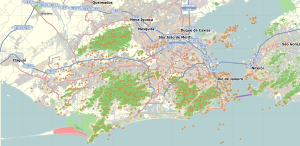Pavuna: Difference between revisions
m Hack moved page Pavuna, Rio de Janeiro to Pavuna over redirect: move per WP:PLACE guidelines for Brazilian place names - unnecessary disambiguation |
m Task 18 (cosmetic): eval 2 templates: hyphenate params (2×); cvt lang vals (2×); |
||
| (8 intermediate revisions by 7 users not shown) | |||
| Line 1: | Line 1: | ||
{{Other uses|Pavuna River|Pavuna Station}} |
|||
{{Infobox settlement |
{{Infobox settlement |
||
|name |
| name = Pavuna |
||
|native_name |
| native_name = |
||
|other_name |
| other_name = |
||
|settlement_type |
| settlement_type = Neighbourhood |
||
|image_skyline |
| image_skyline = |
||
|imagesize |
| imagesize = |
||
|image_caption |
| image_caption = |
||
|image_map |
| image_map = |
||
| |
| pushpin_map = Brazil Rio de Janeiro |
||
| ⚫ | |||
|coordinates_region = BR |
|||
| subdivision_type = [[List of sovereign states|Country]] |
|||
|pushpin_map = Brazil Rio de Janeiro |
|||
| ⚫ | |||
| ⚫ | |||
| |
| subdivision_type1 = [[States of Brazil|State]] |
||
| subdivision_name1 = [[Rio de Janeiro (state)|Rio de Janeiro (RJ)]] |
|||
| ⚫ | |||
| ⚫ | |||
|subdivision_type1 = [[States of Brazil|State]] |
|||
| |
| subdivision_name2 = [[Rio de Janeiro]] |
||
| ⚫ | |||
| ⚫ | |||
| |
| subdivision_name3 = [[Rio de Janeiro#North Zone|North Zone]] |
||
| subdivision_type4 = |
|||
| ⚫ | |||
| subdivision_name4 = |
|||
|subdivision_name3 = [[Rio de Janeiro#North Zone|North Zone]] |
|||
| |
| leader_title = |
||
| |
| leader_name = |
||
| established_title = |
|||
|leader_title = |
|||
| |
| established_date = |
||
| |
| area_total_km2 = |
||
| |
| population_as_of = |
||
| ⚫ | |||
|area_total_km2 = |
|||
| |
| population_total = |
||
| ⚫ | |||
| ⚫ | |||
| |
| timezone = |
||
| ⚫ | |||
| ⚫ | |||
| coordinates = {{coord|22|49|18|S|43|20|26|W|region:BR|display=inline,title}} |
|||
|timezone = |
|||
| elevation_footnotes = |
|||
| ⚫ | |||
| |
| elevation_m = |
||
| ⚫ | |||
|longd=43 | longm=20 | longs=26 | longEW = W |
|||
| |
| website = |
||
| |
| footnotes = |
||
| ⚫ | |||
|website = |
|||
|footnotes = |
|||
}} |
}} |
||
'''Pavuna''' is a |
'''Pavuna''' is a neighbourhood in the [[Rio de Janeiro#North Zone|North Zone]] of [[Rio de Janeiro]], [[Brazil]]. It is one of the oldest places in Rio de Janeiro. |
||
==History== |
==History== |
||
| ⚫ | The place was originally inhabited by native Brazilians from several [[Tupi people|Tupi]] tribes, one of those tribes was named Upabuna, this name being the origin of the name of the Pavuna River.<ref name="nameinfo">{{cite web|url=http://www2.rio.rj.gov.br/governo/pavuna.cfm|title=Histórico|publisher=Rio de Janeiro Government|access-date=February 27, 2011|language=pt}}</ref> During the 16th century, when Brazil was a colony of Portugal, the Portuguese government brought African slaves to the place to work in the sugarcane cultivation.<ref name="nameinfo" /> In the seventeenth century, the sugarcane cultivation entered a period of decadence, only recovering a century later, and then being replaced by the coffee production.<ref name="nameinfo" /> On July 23, 1981, Pavuna officially became a Rio de Janeiro neighbourhood.<ref name="foundation">{{cite web|url=http://www2.rio.rj.gov.br/smu/buscafacil/Arquivos/PDF/D3158M.pdf|title=Origem do nome Pavuna|publisher=Rio de Janeiro Government|access-date=February 27, 2011|format=PDF|language=pt}}</ref> |
||
| ⚫ | The place was originally inhabited by native Brazilians from several [[Tupi people|Tupi]] tribes, one of those tribes was named Upabuna, this name being the origin of the name of the Pavuna River.<ref name="nameinfo">{{cite web|url=http://www2.rio.rj.gov.br/governo/pavuna.cfm|title=Histórico|publisher=Rio de Janeiro Government| |
||
==Etymology== |
==Etymology== |
||
Pavuna means |
''Pavuna'' means "dark place" in the language of the local native Brazilians who inhabited the place in the past.<ref name="nameinfo" /> |
||
==References== |
==References== |
||
| Line 55: | Line 52: | ||
{{Rio de Janeiro city neighbourhoods}} |
{{Rio de Janeiro city neighbourhoods}} |
||
[[Category:Neighbourhoods in |
[[Category:Neighbourhoods in Rio de Janeiro (city)]] |
||
Latest revision as of 18:59, 31 December 2020
Pavuna | |
|---|---|
Neighbourhood | |
| Coordinates: 22°49′18″S 43°20′26″W / 22.82167°S 43.34056°W | |
| Country | |
| State | Rio de Janeiro (RJ) |
| Municipality/City | Rio de Janeiro |
| Zone | North Zone |
Pavuna is a neighbourhood in the North Zone of Rio de Janeiro, Brazil. It is one of the oldest places in Rio de Janeiro.
History[edit]
The place was originally inhabited by native Brazilians from several Tupi tribes, one of those tribes was named Upabuna, this name being the origin of the name of the Pavuna River.[1] During the 16th century, when Brazil was a colony of Portugal, the Portuguese government brought African slaves to the place to work in the sugarcane cultivation.[1] In the seventeenth century, the sugarcane cultivation entered a period of decadence, only recovering a century later, and then being replaced by the coffee production.[1] On July 23, 1981, Pavuna officially became a Rio de Janeiro neighbourhood.[2]
Etymology[edit]
Pavuna means "dark place" in the language of the local native Brazilians who inhabited the place in the past.[1]
References[edit]
- ^ a b c d "Histórico" (in Portuguese). Rio de Janeiro Government. Retrieved February 27, 2011.
- ^ "Origem do nome Pavuna" (PDF) (in Portuguese). Rio de Janeiro Government. Retrieved February 27, 2011.

